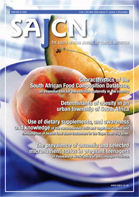Understanding the determinants of obesity
Abstract
It has been well established that overweight and obesity are associated with an increased likelihood of type 2 diabetes mellitus, hypertension, hyperlipidaemias, cardiovascular diseases and certain cancers i.e. breast, colorectal and uterine cancer. Obesity can therefore be regarded as an important factor in the increasing prevalence of non-communicable diseases and thus contributes to premature mortality in the population. In South Africa, 87% of type 2 diabetes, 68% of hypertensive disease, 61% of endometrial cancer, 45% of ischemic stroke, 38% of ischaemic heart disease, 31% of kidney cancer, 24% of osteoarthritis, 17% of colon cancer and 13% of postmenopausal breast cancer were attributable to a BMI >= 21kg/m2. Being overweight or obese was estimated to have contributed to 36 504 deaths of all deaths in South Africa in 2000. Furthermore, a survey in an economically active population in South Africa documented that certain risk factors were predictive of being overweight or obese. These included Black ethnicity, low level of education, inactivity and at least one overweight parent.
Published
2008-11-12
How to Cite
Steyn, N., & Labadarios, D. (2008). Understanding the determinants of obesity. South African Journal of Clinical Nutrition, 21(4), 304-305. Retrieved from http://sajcn.co.za/index.php/SAJCN/article/view/295
Issue
Section
Editorial
Material submitted for publication in the South African Journal of Clinical Nutrition (SAJCN) is accepted provided it has not been published elsewhere. Copyright forms will be sent with acknowledgement of receipt and the SAJCN reserves copyright of the material published.
The SAJCN does not hold itself responsible for statements made by the authors.


